Posted on Friday, June 3rd, 2022
It had been two long years since Algonquin College had celebrated its graduates with an in person ceremony, but on Friday, June 3 the traditional pomp and circumstance of a convocation ceremony returned to the venerable Pembroke Memorial Centre. The 70-year old arena that has hosted the Pembroke Campus annual celebration of its graduates for more than a decade was transformed, decorated in black curtains, large video screens and a well lit stage with the College’s Coat of Arms as its focal point.
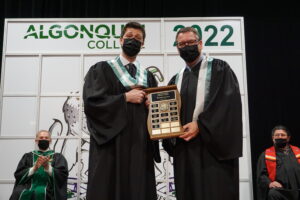 (Valedictorian Steven Lafond receives the valedictorian plaque after delivering an inspiring message to the graduating class of 2022.)
(Valedictorian Steven Lafond receives the valedictorian plaque after delivering an inspiring message to the graduating class of 2022.)
All of the elements of a convocation ceremony were back. The President’s address, a message from the school valedictorian, the conferring of certificates, diplomas and degrees and most noticeably, the clapping and cheering for the graduates. It was special. It reminded all of us of what we had missed over the past 24 months.
 (The graduating class of 2022 sit in front of the main stage, awaiting their opportunity to be celebrated as graduates.)
(The graduating class of 2022 sit in front of the main stage, awaiting their opportunity to be celebrated as graduates.)
President Claude Brulé delivered a fitting message, reminding the graduates that life “is a zig zag,” encouraging them to pull together all of their life experiences to create their pathway for success. “Instead, build your life portfolio with a variety of experiences — some from work, some from your social and family activities, some from your hobbies or leisure time. Together, it will create a mosaic that is uniquely you, a rich profile that will take you places you might not have originally imagined, where your passion makes a difference and your tenacity makes you proud,” said the President.
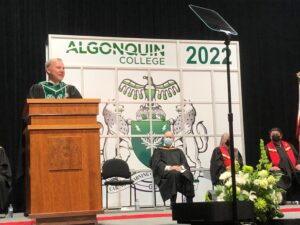 (College President Claude Brulé addresses the graduates, congratulating them for their resiliency during the COVID-19 pandemic.)
(College President Claude Brulé addresses the graduates, congratulating them for their resiliency during the COVID-19 pandemic.)
Pembroke Campus Valedictorian, Steven Lafond, knew exactly what the President was talking about. He had landed what he considered a dream job on Canada’s west coast shortly before the pandemic began in March of 2020, working as a production manager for a theatre in Vancouver. In an instant, he was out of work as the arts and entertainment industry was plunged into darkness. Lafond faced an uncertain future. He chose to return to school, enrolling in the Business program at the Pembroke Campus.
Lafond told the graduates, “Some of you may have faced a similar crossroads. As a mature student, returning to college wasn’t an easy decision, but I knew it was the right decision for me.” 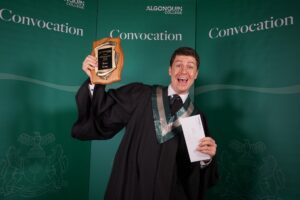 (Campus valedictorian Steven Lafond of the Business program is all smiles after the ceremony.)
(Campus valedictorian Steven Lafond of the Business program is all smiles after the ceremony.)
The decision to attend college has already paid off. Lafond has secured a full-time position with the federal government, working as Ministerial Appointments Officer for the Corporate Secretariat. His message to his classmates reflected on his own experience facing adversity, but stressed the importance of controlling your own destiny.
“So be confident — be bold! And most importantly believe in yourself. Because if you can earn a college certificate, diploma or degree during a pandemic, you can do anything,” said Lafond.
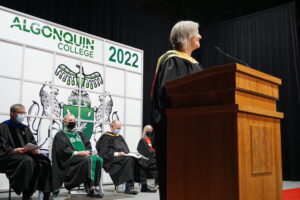 (Acting Dean Sarah Hall presents the graduates to the President, recommending them for graduation.)
(Acting Dean Sarah Hall presents the graduates to the President, recommending them for graduation.)
Some graduates chose to watch the ceremony online, but many did attend in person as did their families. Physical distancing and mask wearing were required, but no one minded. Everyone was just happy to be marking this significant milestone in the lives of our graduates, who have now moved on to become alumni of Algonquin College.
Congratulations to the class of 2022!
(Posted by Jamie Bramburger, Manager of Community and Student Affairs)
Posted on Monday, May 16th, 2022
For four days, employees and students at the Pembroke Waterfront Campus watched as the new mural came to life. What started with a community painting day ended with a vibrant display of colour and powerful imagery that brings attention to Algonquin College’s commitment to celebrating diversion and inclusion at all of its campuses.
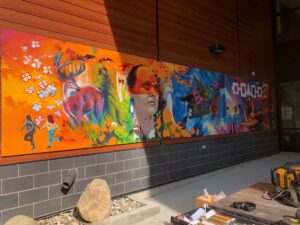
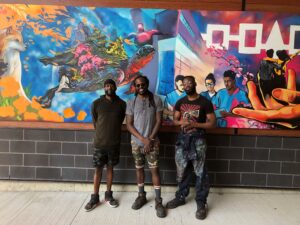
L to R: Kalkidan Assefa, Jimmy Baptiste and Allan Andre spent a week at the Pembroke Waterfront Campus, where they painted an outdoor mural at the campus, helping to celebrate the tenth anniversary of the campus.
Initiated by the College’s Inclusion and Diversity Circle, the project intentionally introduced street art style murals to the Ottawa, Pembroke and Perth campuses in an attempt to tackle visual representation as a barrier to belonging in the college community. The artists, Jimmy Baptiste, Allan Andre and Kalkidan Assefa, provided a dream team of artists who used paint brushes and spray paint to showcase their talent in creating a centrepiece for the campus.
By using street art, the mural is deeply rooted in Black and Latinx culture and creates a welcoming message that is not restricted by colonial perceptions of art. The art is rooted in social equity and tackles visual representation by helping to create a more welcoming place for people from all cultures and races. It also weaves in Indigenous story-telling through the inclusion of animals and a Wampum belt.
The murals that have now been completed at the three campuses are all connected. Where one mural ends, the next one begins, sharing a common message that was inspired by the Algonquin College community. Choosing the murals’ different elements came from consultations involving the artists listening to various stakeholders, including college employees and students.
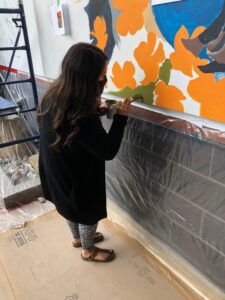
Campus employees, students and members of the community contributed to the mural painting.
What makes the mural incredibly personal is that it involved so many hands. At each campus, community painting days were held, allowing novice painters to contribute to the mural by painting small sections of the artwork. At the Pembroke Campus, more than 40 employees, students and community members participated, adding colour to what has become a signature piece of artwork for both the College and the city of Pembroke.
The mural is located in a covered picnic table area on the North side of the campus, easily seen from the Kiwanis Walkway, which provides a recreational space for walkers and bikers along the shores of the Ottawa River. The walkway attracts thousands of people annually who get their exercise and can now enjoy some beautiful art as they pass by the college.
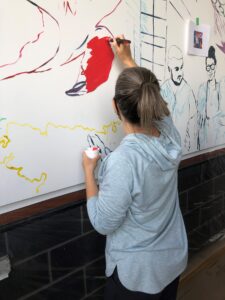
As the project progressed, many people stopped by to admire the work that was being done by the artists and to learn more about the mural. The artists were very accommodating, even modest, as they graciously accepted the compliments that were delivered to them by an appreciative audience.
The mural is a conversation starter and sends an important message to the entire community while reinforcing Algonquin College’s commitment to diversity and inclusion. The mural has done exactly what it was intended to do. It loudly states, “We all belong.”
(Posted by Jamie Bramburger, Manager of Community and Student Affairs at the Pembroke Campus)
Posted on Sunday, April 24th, 2022
Mathew Sheahan had considered it unfinished business. In the summer of 2019, he and two friends planned a 52-kilometre trek of a part of Sawbuck Trail, one of the toughest hikes in Alberta’s Rocky Mountains, but the trip didn’t turn out as they had expected. It could have been a disaster, but for Sheahan, it became a watershed moment that drove him to enrol in the Outdoor Adventure program at Algonquin College’s Pembroke Waterfront Campus.
Sheahan brought memories of that experience to Algonquin College, hoping the program would give him an opportunity for redemption. He needed to prove to himself that he could return to the Rockies, hoping to retrace his steps after learning the skills he felt he needed to manage the risks of the excursion. He set his sites on what is known as the final expedition, the culminating experience for Outdoor Adventure students at the end of their program.
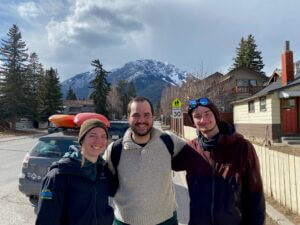
(Annalee Kanwisher and Anthony Balaz joined Matt Sheahan on their final expedition in the Outdoor Adventure program, agreeing to take Sheahan back for another attempt at the Sawback Trail)
During their Final X, groups of students plan a trip anywhere in the world, putting together detailed plans that are reviewed by their faculty before the students embark on what is often a very mentally and physically challenging activity. For Sheahan, it would look much different than the trip he and his two buddies had embarked on three years earlier.
The Sawback trail is located in Banff National Park in the rugged and beautiful Sawbuck Mountain range. It is filled with picturesque vistas including many alpine lakes and three spectacular passes. It’s considered a moderate to difficult hiking trip for experienced hikers with trip advisors recommending that travelling through the passage is best to do between July and September.
Having spent two years co-leading canoe expeditions in Frontenac Park, Sheahan had accumulated some outdoor adventure skills, but they were limited and his friends were really green when it came to backpacking, one of them having never gone on a camping trip in his life. It was supposed to be a six-day trip and because it was June, the group brought along sweaters and sweatpants, just in case the nights turned a bit chilly. “Our expectations were that this trip would in fact be simple, contrary to what online reviews had said,” recalls Sheahan.
But it wasn’t simple. It could in fact have cost the three young men their lives. Given their collective camping and hiking experience, it was an ambitious undertaking. They quickly learned it was a task they were ill-prepared for, especially when they were met by frigid temperatures, swirling winds and unexpected snowfall that left them exhausted and lost. They also determined they were in an avalanche zone and none of them had any safety training to protect them from the sudden cascade of tons of snow plowing down a mountainside.
The first three days of the trip went well. Daytime temperatures were close to 20 Degrees Celcius with overnight lows of about 10 Celcius, but on day four things changed when the men were unsure of where they were. They were at the base of a valley, surrounded by mountains. “It was here that we rolled the dice and decided to head North up a high-altitude mountain pass where we would eventually find ourselves in knee-deep snow,” recalls Sheahan.
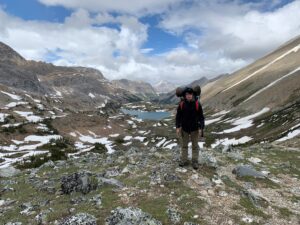
(In 2019, Matt Sheahan and two friends tackled the Sawback Trail in Canada’s Rocky Mountains. It was an experience that changed his life and led him to Algonquin College’s Outdoor Adventure program so he would be better trained for the next time he attempted the trail.)
The trip up the mountain was treacherous. The group decided to come back down the same route they had taken so they could find a place to camp for the night. They could see a storm brewing in the distance and could feel the temperatures dropping. By nighttime, it had fallen to -5 Celcius. By morning, they awakened to snow and colder temperatures.
The sudden onslaught of winter conditions left the men cold and disoriented. Their clothing was wet, their bodies sore and the dampness of the conditions bit through their skin causing them to start questioning what they had got themselves into. They soon discovered they weren’t alone.
They were happy to meet another couple who were also trying to find their way in the harsh conditions and weren’t sure what direction to go. The group reached consensus to take a well-worn trail but when it led to a cliff edge they discovered it was a trail made by animals and now they truly were lost. Even worse, the trail they made behind them was disappearing as blizzard conditions blew the snow around and the temperature fell to -15 Celcius.
The group managed to find their way back to the main Sawback Trail, but by this point, Sheahan was exhausted. He had been carrying a 100-pound food barrel on his back for days. The higher altitude made the barrel feel heavier and the tight straps wrapped around his shoulders to secure the barrel were cutting off the blood circulation in his arms. He had barely had anything to eat in the last 24 hours and the lack of calories had him feeling weak. He collapsed.
Concerned for their trip leader, Sheahan’s two friends helped him take the barrel off his back and laid him under a pine tree where the couple who had joined them provided him with a portable heat source they had brought with them to help get the blood circulating in his body. It turned out the couple both had medical backgrounds, one of them being a family physician. Had they not been there, Sheahan isn’t sure what would have become of him.
The backpackers eventually got back on track and made it to their final destination, Lake Louise, where they celebrated the completion of the trip and reflected on the experience and the mistakes they had made. It was a turning point for Sheahan who was studying geography and sociology at Carleton University in Ottawa. The experience prompted him to leave university and enroll in the Outdoor Adventure program, primarily because he knew he needed to better understand risk management because his heart told him it wouldn’t be the first time he would tackle the great outdoors.
Fast forward to the spring of 2022 and Sheahan pitched his idea to a few classmates to re-trace his tracks along the Sawback Trail. He found a couple of students who were willing to join him on the expedition, Annalee Kanwisher and Anthony Balaz, and the three started mapping out their journey, which was scheduled for April 11 to 17, meaning it would still be winter conditions in the Mountains.
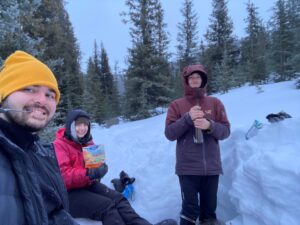
(During their final expedition, the three Outdoor Adventure students kept a log of the trip that included a video that captures the challenges they faced and the toll the hiking trip took on all of them.)
Some of the trip was déjà vu for Sheahan. He and his new hiking teammates again faced wintry weather, but this time it was much colder. The mercury sometimes dipped to minus-30 Celcius. Their boots got wet, their feet blistered, they were cold and the walking was often difficult. Sheahan was again the trip leader. He knew morale had dropped the further the classmates got into the expedition.
At one point they contemplated turning back, but they persevered. By the time they exited the trail, they were exhausted but also satisfied that they had accomplished what they had set out to do. They knew they had prepared well, but also realized that the backcountry can be unpredictable and they had chosen a difficult time of the year to take on the Sawback Trail.
It was the final assignment in a two-year Outdoor Adventure program that was offered during a worldwide pandemic. Sheahan and his classmates still spent many hours learning skills in outdoor settings but spent more time than previous cohorts learning virtually. But as his post-secondary journey at Algonquin comes to a close, Sheahan is pleased he has accomplished one of his key goals-better understanding risk management in outdoor activities.
“Prior to joining this program, I would not have imaged myself climbing waterfalls, sea kayaking in windstorms or rafting down class three rapids, but having done these things now, I am confident I can lead clients through those same situations,” says Sheahan.
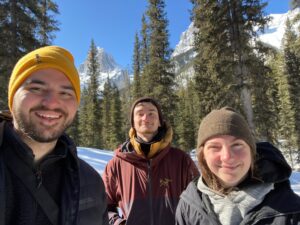
Matthew Sheahan is on a life-long journey. A narrow escape in some of Canada’s most rugged territory brought him to the Outdoor Adventure program and a commitment to learning helped him learn from his previous mistakes and has inspired him to continue to explore some of the most interesting places on earth. He has proven he has the spirit and the drive to be an adventurer, but now he knows his career comes with risk and he is much better prepared to face the next Sawback Trail.
He achieved what he set out to do when he enrolled in the Outdoor Adventure program, and this time he was satisfied he did things right. It wasn’t easy, but after logging 130 kilometres, far more than the group had planned, he appreciates that every adventure activity he engages in is a learning experience.
“While as a group we all agreed we wouldn’t do that route again, winter expeditions like this one are certainly going to be in my future. I really enjoyed the challenge and what it means to push my limits, whilst still understanding the risk affiliated with each venture. It was certainly a valuable skill that ODA taught me,” says Sheahan.
Canada is a vast country with a lot of backcountry. Sheahan might be just getting started as an Outdoor Adventure explorer. With each experience, he’ll continue to learn, but at least now he has a foundation to build on. He found redemption in the Rockies.
Posted on Tuesday, April 19th, 2022
Patti Kim remembers the email. It popped up on her phone while she was working in her librarian’s office at Algonquin College’s Pembroke Waterfront Campus. The email informed her that she had been accepted to run in one of the most prestigious marathons in the world. She was going to Boston, the New England city steeped in history including its famous annual running race which attracts more than 30,000 participants from around the world.
The dream to run in the Boston Marathon materialized after Kim and her family moved to the outskirts of Pembroke. She quickly learned that living in the country, particularly in the late spring and early summer is bug season. She wanted to get more exercise and began walking, but walking became running to get away from the bugs and one thing led to another and soon she was running long distances.
“So, in a funny way, I started ‘sprinting’ to try to outrun the bugs and in the end, the running bug caught me,” says Kim.

Did it ever. In the past five years, Kim has had several races of 5 and 10 kilometres, trail races, half and full marathons, all leading her to her first Boston Marathon. “Knowing that the Boston Marathon is considered to the holy grail for distance runners, I became curious as to whether it was possible for me, a full-time librarian, a middle-aged recreational runner, and a Mom of twin girls, to achieve a Boston qualifying time. As my times got faster, my curiosity went from ‘Can I do this?’ to ‘I can do this!’”
So, to test herself, she registered in the Muskoka Marathon in Bracebridge, Ontario on October 2, 2021 knowing she would need a time of better than 3 hours and 50 minutes to qualify for Boston. She finished the race in 3:49:14, and Kim was excited when the email arrived to let her know she was on her way to the historic city which was founded in 1630 and is known for its higher education schools, including Harvard University.
Now that it was real, Kim turned her attention to being prepared for the gruelling 42.2-kilometre race. She scoped the route of the marathon, taking into consideration Boston’s hilly terrain which makes the course an even more challenging experience for runners. She considered the weather conditions she might encounter on race day and she focused on being both physically and mentally prepared to ensure she would cross the finish line near Boston’s Copley Square, an upscale neighbourhood known for its dining and shopping district.
“I started off with shorter runs and then gradually went up from there sprinkled with what are called ‘down weeks’ when you let your body recover before another high mileage week. It is quite a bit of running, plus speed workouts such as progressively longer intervals, tempo runs and strides. The long run is the most important run of the week that gets runners used to running long on tired legs,” says Kim.
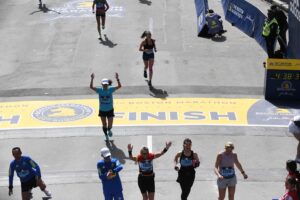
On Patriot’s Day in Boston, Monday, April 18, Kim fulfilled her aspirations to run in the Boston Marathon. Wearing bib number 22072, she crossed the finish line with a time of 4 hours, 7 minutes and 57 seconds.
Exhausted but satisfied, Kim took the time to celebrate with other women who had completed the race as it marked the 50th anniversary of women being allowed to participate as official race entrants. In 1972, there were only eight women who completed the race. For the 126th running of the race in 2022, almost half of the 30,000 runners were women.
“Running is hard, period,” says Kim, but for a runner there is nothing like the feeling that comes from recording a personal best or completing a marathon. It will take Kim weeks to get over the pain of the race and the toll it has taken on her body, but before long she will be running again.
The memories of running in Boston will stay with Kim forever, and maybe she’ll do it again. She has climbed the pinnacle of distance running by challenging herself to compete in the world’s best-known marathon. For now, she’ll enjoy the moment and think about the encore later. It’s time to get some rest.
Posted on Friday, March 4th, 2022
The COVID-19 pandemic disrupted many things including post-secondary education, but it also provided an opportunity for faculty at Algonquin College’s Pembroke Waterfront campus to become very adept at delivering curriculum in a virtual learning environment. Now, as COVID restrictions are loosened, faculty in the Business program are taking another step to providing students with more choice in how they access their courses.
Starting in the Fall of 2022, students enrolled in the Business program will be able to come on campus or access their classes online. The learning environment is called multi-modal. Classrooms are equipped with cameras and microphones to allow students to join from the comfort of their home, while other learners who appreciate a more traditional learning experience, can come on campus. The best part is it’s not an exclusive choice, meaning students have the flexibility to choose on a daily basis whether they want to be in class or online.
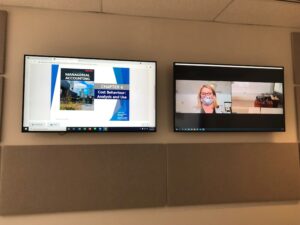
“It’s really the best of both worlds for students,” says Business Program Coordinator, Kim Drake. Drake was among the early adopters of the multi-modal approach. She tested the technology in the Fall of 2021 and learned a lot about how to engage with students who were physically in her teaching space and those who were connected through the Internet.
“Like our students, I’m still learning, but I know this is the way of the future. Students are looking for more choice and our program is well positioned to offer them this flexibility because it is theory based,” says Drake.
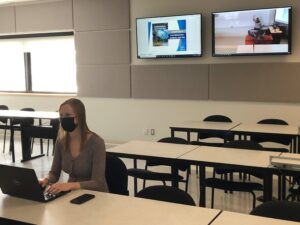
The College’s Business program has always been on the leading edge when adapting to technological advances. It was the first program at the Pembroke Campus to introduce mandatory laptops for students 15 years ago and when e-text books arrived, the program also embraced their use to enhance the student learning experience.
“Business is always evolving and it’s important that we demonstrate to our students that we are paying attention to how technology is changing the way businesses operate, including educational institutions, so that our students are prepared for the workforce,” says Drake.
The Business program also offers a co-op stream, an opportunity for students who maintain a high academic standing to participate in a four-month summer paid work place experience. Co-op also offers additional support to students to help them with their job search and career exploration, but most importantly it helps students gain invaluable work experience before they graduate.
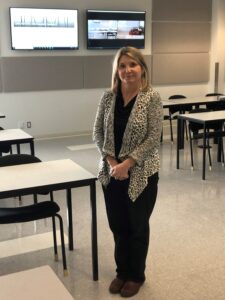 (Business Program Coordinator, Kim Drake, is excited about the possibilities as the College introduces multi-modal classrooms that provide more flexibility in how students access their education.)
(Business Program Coordinator, Kim Drake, is excited about the possibilities as the College introduces multi-modal classrooms that provide more flexibility in how students access their education.)
Past graduates have also pursued higher education by taking advantage of articulation agreements with other colleges or universities. These opportunities include Advanced Business Diplomas or a Bachelor of Commerce or Bachelor of Business Administration Degree. This has been particularly attractive to local students who enjoy the benefits of studying in a smaller Business program with easier access to faculty and support services, before moving to a larger post-secondary school. Studying closer to home has also allowed them to save money because they didn’t have the added expense of living out of town.
The program is offered in a compressed delivery schedule. Students can earn a two-year college diploma in 16 months and now they have the flexibility to access the program without the requirement to be on campus for classes.
Applications to the Business program are available through the Ontario College Application Service. More information about the program can be found on the Pembroke Campus website at: https://www.algonquincollege.com/pembroke/program/business/
(Posted by Jamie Bramburger, Manager of Community and Student Affairs)
Posted on Thursday, February 17th, 2022
Gurdeep Pandher became a Canadian citizen in 2011 and is now one of the Yukon’s best known citizens. Videos of his Bhangra dancing outside of his cabin in the Yukon have become a social media sensation and have given Canadians hope as we approach the two year anniversary of the start of the COVID-19 pandemic in North America.
Pandher headlined a great line-up of Winterfest activities and presentations during Algonquin College’s Pembroke Campus winter carnival recently when he provided an inspirational talk on bringing joy into your life, followed by an up tempo 30 minute Bhangra dance lesson that left students and employees out of breath but filled with happiness.
“We sometimes achieve joy with conditions like wanting to buy a new car. If you set conditions, joy won’t come to you. Joy requires unconditional happiness. You have to re-wire your mind. It is created from inside you. You can learn the skill to be joyful,” Pandher told his audience.

Pandher has become so popular through his speaking engagements, Bhangra dancing has become his primary work. He has danced all across Canada, performing with members of Canada’s military, front line health care workers, school children and politicians.
He was discovered six years ago when a video was posted of him dancing on Canada Day in the Yukon. It quickly went viral on social media and Pandher was flooded with media requests leading to international news coverage. Since then he has regularly posted videos on platforms like Twitter and Facebook, spreading a message of happiness.
It was from his cabin in the Yukon where he joined College students, alumni and employees to share his thoughts on how to live a more fulfilled life by being happy. He stressed that we have to create our own positivity in our day to day lives, despite the challenges that can leave us feeling down.
“Hope is very powerful. When I cling to hope, I find my joy, even when things are not going the way I want,” says Pandher.
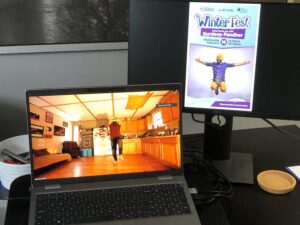
Last summer, Pandher began a cross Canada tour intended to bring his “happy dance” to Canadians from coast to coast. He had to cut the trip short because of the pandemic, but hopes to finish it this year. One of the highlights was dancing at Parliament Hill but when it comes to his favourite place to dance, it’s a place few Canadians have ever been to.
Located near Dawson City in the Yukon, Pandher calls Tombstone National Park the most “creative natural beauty,” he has ever seen. “There is a spiritual power in the mountains, like a magnet. Nature is everywhere,” exclaims Pandher.
Joy is what Winterfest is intended to bring to students at the Pembroke Waterfront Campus. Despite the ongoing COVID-19 pandemic, the campus has put together several virtual and outdoor activities this week that are providing students and employees with an opportunity to celebrate winter.

The line-up has included a special virtual Valentine’s Day concert by Canadian Country recording artist and Pembroke Campus alumnus Jason Blaine, free skiing and public skating passes, virtual yoga and online games and a social media contest that encourages students to show what winter activities they enjoy the most. Winterfest continues through Saturday, February 19th.
(Posted by Jamie Bramburger, Manager of Community and Student Affairs)
Posted on Tuesday, February 8th, 2022
As a student at Algonquin College’s Pembroke Waterfront Campus, Brittaney Fraser-McCann was an inspiration to others who were pursuing a college education. She was a single mother who was trying to balance her schedule between taking classes at the college and parenting. It wasn’t easy and it required her to extend her educational journey, sometimes she was only able to study part-time, but by 2013 McCann-Fraser had graduated from the Practical Nursing program.
It was a significant accomplishment and she quickly found work at the Pembroke Regional Hospital. She primarily worked in the rehabilitation unit, always bringing a positive attitude to work and the “can do” spirit that allowed her to face the day to day challenges of life.
Fraser-McCann and her husband Kelly McCann had a busy household. The couple had added three more boys to the family unit, but in February of 2021, Fraser-McCann suffered a brain aneurysm that required an endovascular coiling procedure to repair the bleeding. The young mother met the diagnosis with determination but while recovering from the medical intervention, doctors discovered she had Moyamoya disease, a chronic and progressive condition that effects the arteries in the brain. It was during a third coiling procedure to try to fix the aneurysm that she passed away at the Ottawa Civic Hospital.
Fraser-McCann was only 33 years old. Her tragic death just prior to the Christmas holidays led to an overwhelming public response as more than $100,000 was raised for her family through a go fund me site. The fundraising campaign was led by a close friend, Stephanie Hewitt who has now teamed with Kristen Leitch, who worked as a nursing colleague with Fraser-McCann, to set up a memorial bursary at the College. The two women say the bursary will keep McCann-Fraser’s memory alive by celebrating her educational accomplishments.

“In 2018 I explored returning to school for the upgrading and networking possibilities. I entered the Pembroke Campus, enrolled in the Business program in Fall of 2019 as a single, sole supporting parent and my biggest cheerleader was my best friend, Brittaney. She understood the challenges and struggles of trying to earn an education while trying to do one’s best as a parent,” says Hewitt.
Finding a way to celebrate Fraser-McCann’s life has been paramount to Leitch who owns HeLa Beauty, a medical spa in downtown Pembroke. Fraser-McCann worked part-time at the health centre and Leitch says setting up the memorial bursary allows her to do something positive as she comes to grips with an incredibly difficult and sad situation.
”Her story inspired me to help create the bursary for another single parent in her name, because I think every successful applicant will have a connection and a relatable story. I think that knowing Brittaney was successful in college will give them the inspiration and comfort to persevere, just knowing it can be done,” says Leitch.
The Memorial bursary will be awarded each year to a Practical Nursing or Bachelor of Science in Nursing student who is enrolled in the Winter term at the Pembroke Campus. It will be earmarked for a single parent, reflecting the challenges Fraser-McCann faced when she enrolled in college.
“It was her college education that gave her the platform to enter into the nursing field after graduation, which ultimately provided her with the means to care for her son. She was proud to be a nurse. This Memorial Bursary will now affirm that Brittaney will forever be a part of the College, paving the way for other single parents that they too, can work hard towards making their dreams a reality,” says Hewitt.
Each year the Pembroke Campus of Algonquin College awards thousands of dollars in bursaries to students who are struggling financially to pay for their post-secondary education. Bursaries are always based on financial need, but can also award students for academic achievement.
A donation platform has also been created for the public to make donations to the Brittaney Fraser-McCann memorial bursary endowment.
(Posted by Jamie Bramburger, Manager of Community and Student Affairs)
Posted on Monday, January 17th, 2022
Viola Desmond just wanted to watch a movie, but what happened to her on November 8, 1946 in Nova Scotia became a watershed moment in Canada’s civil rights movement. Desmond was a successful Black businesswoman, operating a beautician training school in Halifax and eventually expanding her business across the province, but it was car trouble that set her on a course that would make her one of Canada’s greatest historical figures.
On that fateful day in 1946, Desmond was travelling on business from Halifax to Sydney when her car started acting up and she was forced to pull into a nearby service garage in the small community of New Glasgow. The garage mechanic told her it would take a day to repair the vehicle so, in order to kill some time, Desmond decided to go to the Roseland Theatre and catch a movie.
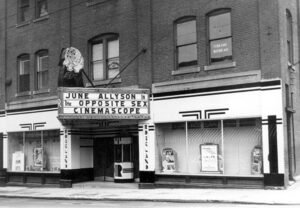
At the ticket counter, Desmond requested and paid for a lower-level seat, but the ticket handler instead gave her a balcony seat, which was the segregated seating for Black patrons. Desmond tried to take a seat on the main level of the theatre anyway but was challenged by an usher and was eventually forcefully removed from the theatre and arrested.
She spent the night in the local jail and appeared the next day before a city magistrate where she was found guilty of defrauding the provincial government for not paying the amusement tax of one cent on the ticket. The penny represented the difference between the ticket for a balcony and the ground level seat. Without any legal representation, Desmond paid a fine of $26 that was levied against her by the presiding Judge, who awarded six dollars of court costs to the theatre general manager.
Nova Scotia’s black community was outraged. While Desmond’s husband wanted her to let things go, the Nova Scotia Association for the Advancement of Coloured People raised money to fight her conviction. She eventually lost her appeal on technical grounds and her case quickly faded from public consciousness. In 2010, long after Desmond’s death in 1965, she was posthumously granted a free pardon by the Nova Scotia government and was recognized for her contributions to the struggle for racial equality in Canada.

On February 1, Algonquin College’s Pembroke Waterfront Campus will kick off Black History Month with a special virtual speaker series presentation on the life and legacy of Viola Desmond by author and civil rights historian Graham Reynolds.
In 2000, Professor Reynolds was teaching a racial discrimination history course at Cape Breton University when he met the younger sister of Desmond, Wanda Robson. Robson was 73 years old but was interested in the course and enrolled. Reynolds describes her as the “life and energy of the classroom.”
“Having Wanda Robson as a student was a defining moment in my career. It began a two-decade long journey and collaboration to raise public awareness regarding the racial injustices of the past, especially in relation to the Viola Desmond story,” says Reynolds.
Robson went on to complete a Bachelor of Arts degree at the university, graduating at 77 years of age, and in 2010 she released her own book entitled, Sister to Courage: Stories from the World of Viola Desmond, Canada’s Rosa Parks.
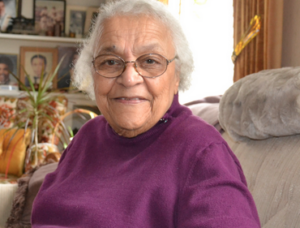
In that same year, a free pardon was granted to Desmond posthumously by the Nova Scotia government, and the Viola Desmond Chair in Social Justice was established at the University. Reynolds was named as Chair and worked with Robson to write a book entitled Viola Desmond’s Canada, which was released in 2016. Two years later, they wrote Viola Desmond: Her Life and Times.
“The Viola Desmond story brings to light a long-forgotten chapter in Canadian history. And, for us to move forward as a nation and build a more just society, we must confront these darker pages of our past,” says Reynolds.
In November of 2018, 72 years after she was dragged out of the Roseland Theatre because of the colour of her skin and 53 years after she passed away, Desmond was honoured by becoming the first woman to appear on a Canadian $10 bill, confirming her place as one of Canada’s most courageous people and historical figures.
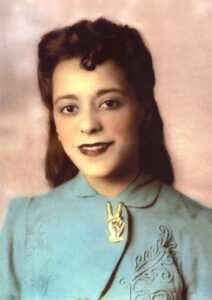
Canadians have been celebrating Black History Month for decades after the first move to recognize the contributions of Black Canadians was made by the city of Toronto which passed a proclamation in 1979. It wasn’t until 1995 that the House of Commons unanimously passed a motion declaring February as Black History Month.
On the 75th anniversary of Viola Desmond’s arrest in 2021, Prime Minister Justin Trudeau told Canadians, “Black people have helped shape our history and collective identify, and stood proud as leaders in communities across the country. Despite all this, systemic anti-Black racism still exists in Canada, and has undermined the livelihoods of Black Canadians and caused deep pain. This needs to stop.”
By taking a stand, Viola Desmond tried to stop racial segregation. Her cause remains active today.
Registration is now open for the Viola Desmond speaker series which will begin at 7 p.m. The session is free to students, employees, alumni and anyone over 60 years of age. You can register here: https://www.eventbrite.ca/e/speaker-series-black-history-month-kick-off-with-author-graham-reynolds-tickets-244517336937
(Posted by Jamie Bramburger, Manager of Community and Student Affairs)
Posted on Tuesday, December 28th, 2021
Like 2020, the year 2021 was dominated by the COVID-19 pandemic and its impact on everyday life. The pandemic leads our year in review at Algonquin College’s Pembroke Waterfront Campus as we reflect on the past 12 months and how our students and employees demonstrated resiliency and worked to help others in need.

The hopes that came with a vaccination to protect people from the virus also required a huge volunteer effort to operate vaccination clinics. Several Pembroke Campus employees and students volunteered their time at the largest clinic in Renfrew County which operated for several months during the spring and summer of 2021 at the Pembroke Memorial Centre.
The vaccines permitted more activity to be held on campus when the Fall term began, but to protect the campus community, the College introduced a mandatory vaccination policy for anyone coming on campus. Daily screening, mask wearing and physical distancing was also required as the College reduced lab sizes and put in additional safety mitigation practices within programs.
For the second year in a row, the College opted to hold a virtual convocation ceremony. One of the highlights of the Pembroke Campus ceremony was the awarding of an Honorary Degree to Toronto Maple Leafs head coach Sheldon Keefe. Keefe spent many years in Pembroke as he started his coaching career with the Junior A Lumber Kings and was a donor to the Waterfront Campus building fund and a bursary set up to support students in financial need.

Photo Source: Maple Leaf Daily News
The Pembroke Campus also celebrated when two of its graduates from the Social Service Worker program, Tom Sidney and Crystal Martin-Lapenskie, were recognized for their career accomplishments when they received an Alumni of Distinction award from the college. Martin-Lapenskie was also nominated for a Premier’s award for her work supporting Inuit youth across Canada, work that included recording a national public service announcement encouraging Inuit to get a COVID-19 vaccination.

Another alumnus was also making us proud. After a year off because of the coronavirus, country recording artist and Business graduate Jason Blaine returned to his hometown of Pembroke to host a revised one-day charity concert and golf tournament. The event was a huge success as it raised $80,000 for special projects and community organizations in the Pembroke area. $10,000 of the funds raised was donated to Blaine’s endowment fund at the Pembroke Campus which supports students who need bursaries to support their educational investment.
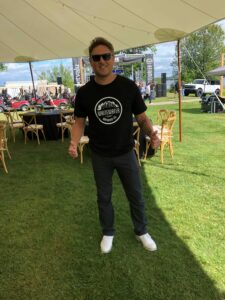
While the pandemic created many challenges, there were also some new opportunities that helped the College broaden its community outreach. The Pembroke Campus had been hosting a speaker series for more than 20 years, but the pandemic forced the campus to move from in-person to virtual presentations. With no travel requirements for speakers, the campus was able to attract some high profile personalities including His Honour Murray Sinclair, who chaired the Truth and Reconciliation Commission, former CBC The National Anchor Peter Mansbridge, Author and Historian Charlotte Gray and Ron MacLean and Tara Slone of Hockey Night in Canada and Rogers Hometown Hockey which paid a visit to Pembroke in December.
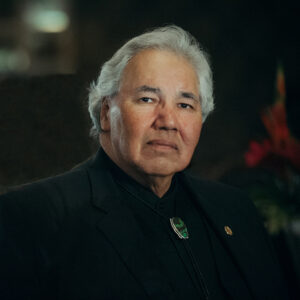
The campus was able to support the Forestry sector through a large government investment of almost $5-million to help the industry attract new workers and train its existing workforce. The Forestry Skills Advance Ontario project was announced in the spring and resulted in several blocks of training being made available to mills and wood manufacturing facilities across the region.
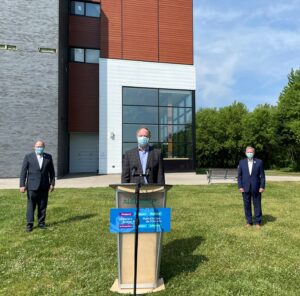
Partnerships were a big part of 2021 for the Pembroke Campus as the College worked with organizations such as the Renfrew County District School Board to offer special dual credit and Ontario Youth Apprenticeship programs that gave high school students a chance to come on campus to experience the skilled trades. A special summer trades camp was offered that gave students a chance to test drive careers in trades such as carpentry and welding.
Forestry students also helped plant 30,000 trees in Algonquin Park and the Nipissing Forest. The project was sponsored by the Ontario Woodlot Association, the Canadian Institute of Forestry, Friends of the Petawawa Research Forest, Nipissing Forest Management Inc., and the Algonquin Forestry Authority, all important partners to the College’s long-standing Forestry Technician program. As a thank you to the students, a $5,000 donation was made to the College in support of its Forestry program.
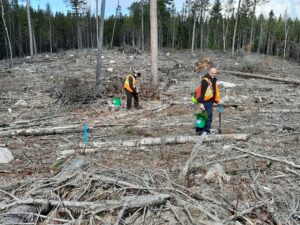
The College continued to expand its programming in 2021 with the launch of the Environmental Management and Assessment post-graduate certificate program which began in January. The program proved to be very population with both Canadian and international students. The campus also announced it would have a first intake for a Computer Programming program in January of 2022.
In April, the campus was able to expand its Employment Ontario footprint in Renfrew County when it began offering Employment Services support to unemployed or underemployed individuals in the Eganville and Barry’s Bay areas. The College’s Academic Upgrading program continued to offer most of its programming remotely, creating new opportunities for learners to access the program.
We have only highlighted a few of the many things that were happening at the Pembroke Campus in 2021. We look forward to creating more memories in 2022. Happy New Year to everyone from all of us at Algonquin College’s Pembroke Waterfront Campus.
Posted on Friday, November 26th, 2021
Peter Mansbridge has interviewed more than 20,000 people over his distinguished career in television journalism, but none of those interviews was tougher than asking questions to former British Prime Minister Margaret Thatcher. During an Algonquin College Pembroke Campus virtual speaker series presentation, Mansbridge described the interview as a “disaster.”
It came after Thatcher had left office and she was promoting a new book that she had written about her political life. “She kept accusing me of not reading her book, which I had, but the interview went nowhere,” said Mansbridge as he responded to questions from a large audience about his career.
The long-time interviewer told the crowd that after the interview had ended, “The Iron Lady” as she was often referred to because of her tough reputation as one of the world’s most prominent leaders, offered to sign his copy of the book. “”At the end, I said thank you and the cameras and the lights were turned off. She looked at me and, for the first time in the 45 minutes we were together, she smiled and said, ‘Peter would you like me to sign your copy of my book?’ The signed book has remained in Mansbridge’s home library ever since, but Mansbridge said he doesn’t think he has ever taken it off the shelf.

Mansbridge described his interview with Gord Downie of the Tragically Hip as emotional. It was one of the last interviews that the musician granted as he battled terminal brain cancer. “It stuck with me. He knew he was dying and yet he had decided he was going to devote the last year of his life to encourage Canadians to work out a relationship between Indigenous and Non-Indigenous peoples. Gord was passionate about it until the day he died,” Mansbridge said.
For 30 years, Mansbridge was the face of CBC television news. He took over the anchor chair of The National after Knowlton Nash graciously stepped aside to spend more time writing books, but Nash did it because Mansbridge was being courted by American television. Nash had been a mentor to Mansbridge and didn’t want to lose him to CBS news which was offering a very lucrative contract and so he gave up the highest profile position in the CBC news department to ensure Mansbridge stayed with the network. By that point, Mansbridge had already spent 20 years with the CBC as a reporter.
Over an illustrious career, Mansbridge covered stories around the world. Most of his time was spent in the CBC’s News headquarters in Toronto, but when big stories broke such as the war in Afghanistan or the 2004 deadly tsunami in Thailand that killed almost 230,000 people, Mansbridge was on the front line bringing the news back to Canadians.
He also branched out across the country, paying particular attention to climate change and its impact on Canada’s artic region. He convinced the CBC to spend a week in the Northwest Passage to show Canadians what was happening. Very few Canadians will ever to get to see what Mansbridge has witnessed in Canada’s far North, a place he calls “beautiful.”

Mansbridge also tiptoed into the future of the monarchy when responding to a question about the Royal Family, calling Queen Elizabeth a remarkable person, noting the first time he covered a story about the Queen was in 1970 when she visited Churchill. “ For most of us she is the only Monarch we have ever known. That is suddenly going to change in the next few years. How we are all going to relate to that, I’m not so sure. She has seen a lot. She is not perfect. When we lose her, it is going to be a very different world. Will the Monarch, the Queen of England, be the Queen of Canada? Those are decisions we are going to have to make in the years ahead,” Mansbridge questioned.
Mansbridge has recently released a book on his life and journalism career called “Off the Record.” In his book he shares how his career in journalism started In Churchill, Manitoba when he was overheard making passenger announcements into a microphone at a small regional airport by a local radio station manager and was hired on the spot because “I had a good voice” according to the station manager. His early work in reporting in private radio was noticed by the CBC and he was soon working for Canada’s public broadcaster. Mansbridge retired in 2017.
Among the audience for the speaker series presentation were several Algonquin College journalism students who had the opportunity to ask for advice on how they can best set their goals and objectives in a competitive industry that Mansbridge says need to re-examine how its builds trust with Canadians. Mansbridge called trust the most important element of covering news stories, adding “we need to focus on being transparent in explaining how we cover the news.”
At the end of the presentation, it was announced that Mansbridge had donated $3,000 to Algonquin College to support students in financial need through bursaries. Mansbridge is one of several high profile speakers who have participated in the College’s virtual speaker series over the past several months. Ron MacLean of Hockey Night in Canada will make an appearance on Tuesday, November 30 at 7 pm as part of Pembroke’s Hometown Hockey Festival the weekend of December 4-6th.
 (Campus valedictorian Steven Lafond of the Business program is all smiles after the ceremony.)
(Campus valedictorian Steven Lafond of the Business program is all smiles after the ceremony.)  (Acting Dean Sarah Hall presents the graduates to the President, recommending them for graduation.)
(Acting Dean Sarah Hall presents the graduates to the President, recommending them for graduation.) (Valedictorian Steven Lafond receives the valedictorian plaque after delivering an inspiring message to the graduating class of 2022.)
(Valedictorian Steven Lafond receives the valedictorian plaque after delivering an inspiring message to the graduating class of 2022.) (The graduating class of 2022 sit in front of the main stage, awaiting their opportunity to be celebrated as graduates.)
(The graduating class of 2022 sit in front of the main stage, awaiting their opportunity to be celebrated as graduates.) (College President Claude Brulé addresses the graduates, congratulating them for their resiliency during the COVID-19 pandemic.)
(College President Claude Brulé addresses the graduates, congratulating them for their resiliency during the COVID-19 pandemic.)











 (Business Program Coordinator, Kim Drake, is excited about the possibilities as the College introduces multi-modal classrooms that provide more flexibility in how students access their education.)
(Business Program Coordinator, Kim Drake, is excited about the possibilities as the College introduces multi-modal classrooms that provide more flexibility in how students access their education.)















